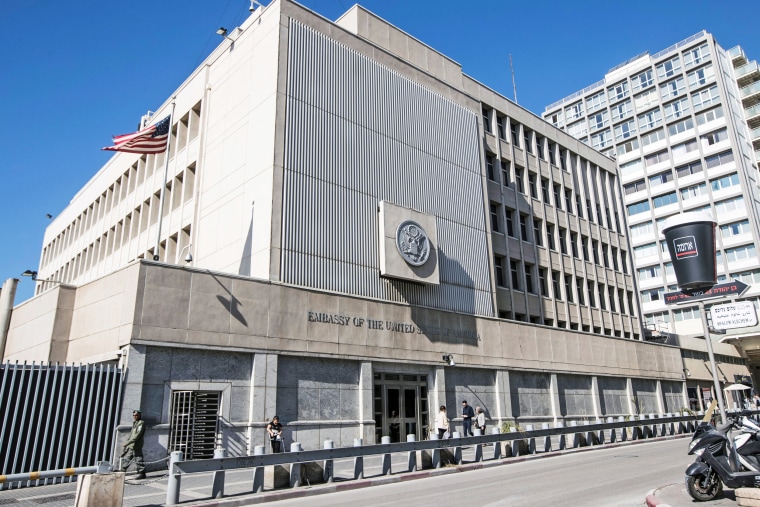WASHINGTON — President Donald Trump will recognize Jerusalem as Israel's capital on Wednesday, while also delaying moving the U.S. Embassy from Tel Aviv to the holy city, officials said.
Though Trump will not relocate the embassy any time soon — one White House official told reporters it could take years — the president still intends to fulfill that promise made early in his administration.
Senior administration officials called Trump's expected recognition of Jerusalem an affirmation of "reality" — both historical and current, pointing out that the city is already home to Israel's parliament, supreme court and other government sites.
Palestinians, however, also claim Jerusalem as their capital, and Trump's anticipated announcement has touched off an uproar in the Arab world.
One U.S. official said Tuesday that America's "policy of ambiguity" in regard to Jerusalem hasn't worked. "It seems clear now that the physical location of the American embassy is not material to a peace deal...it's not an impediment to peace and it's not a facilitator to peace," the official said.
The president is prepared to support a two-state solution if agreed to by both Israel and the Palestinians and he remains "optimistic" about the prospects of a peace deal, the officials said.
Moving the embassy will "take some time," another senior administration official said Tuesday, putting a "years" long estimate on the process, but the official added that the president's Wednesday announcement will at least set the expectation for the move going forward.
U.S. officials said that both Defense Secretary James Mattis and Secretary of State Rex Tillerson voiced concerns about the threat that moving the U.S. embassy would create for American personnel from both agencies stationed in the region.
At a recent meeting to discuss the move, the president expressed frustration over the idea that despite his campaign promise, he would be signing the six-month waiver to once again delay moving the embassy.
Despite concerns expressed by some at the meeting, two U.S. officials confirmed that Vice President Mike Pence and Ambassador to the U.N. Nikki Haley were in support of the president's decision to announce he was recognizing Jerusalem as Israel's capital.
Meanwhile, world leaders have expressed grave concerns about the pending move, which Palestinian and Arab leaders have warned could inflame the Arab world, spark violence and further derail an already tenuous peace process.
Ahead of the announcement, Trump held a series of phone calls on Tuesday with leaders in the Middle East.
The president spoke to Israeli Prime Minister Benjamin Netanyahu, King Abdullah of Jordan and Palestinian Authority President Mahmoud Abbas, the White House said. On Monday, the president spoke with French President Emmanuel Macron about the "path to peace in the Middle East," according to the White House.
After Trump's call with Abbas, a spokesman for Abbas, Nabil Abu Rudeineh, said Trump "briefed President Abbas on his intention to move the U.S. embassy from Tel Aviv to" Jerusalem, though no official decision was conveyed.
Abbas warned Trump about "the dangerous implications for such a decision on the peace process, the security and stability in the region and the world" and called the possible move "an unacceptable step," Rudeineh said.
Jordan's official news agencies also reported that Trump updated King Abdullah on his intention to move the embassy.
In their phone call, King Abdullah warned of pre-empting a comprehensive solution that leads to the establishment of a Palestinian state, with East Jerusalem as its capital, the statement said. "His majesty emphasized that Jerusalem is key to achieving peace and stability in the region and the world."
The king affirmed that the decision will have serious implications that will undermine efforts to resume the peace process and will provoke Muslims and Christians alike.
Turkish President Recep Erdogan, meanwhile, called Jerusalem "the red line for Muslims."
Iraqi Prime Minister Haider al-Abadi condemned the possible embassy announcement, saying that it would be seen a hostile move against Arabs and Muslims.
But administration officials believe that those parties who want peace will stay at the negotiating table, regardless of this latest move.
A senior administration official said Tuesday that the president's decision still leaves space for the Palestinians to move forward in this peace process. Another official added that the parties Trump has spoken to about the change "wish to remain engaged" on peace talks.
Trump has been outspoken about both his support for Israel and his desire to broker a lasting Middle East peace. The president has tapped his son-in-law, Jared Kushner, to lead the peace effort.
At a news conference with Netanyahu at the White House in February, Trump said he would "love to see" the U.S. Embassy moved to Jerusalem and that "we're looking at it very, very strongly."
"We're looking at it with great care, great care, believe me. And we'll see what happens, OK?"
Since the 1979 Camp David Accords, U.S. presidents have refused to recognize Jerusalem as the capital of Israel or move the U.S. embassy. The U.S. approach has been that Jerusalem's status should be negotiated between the Israelis and Palestinians.



